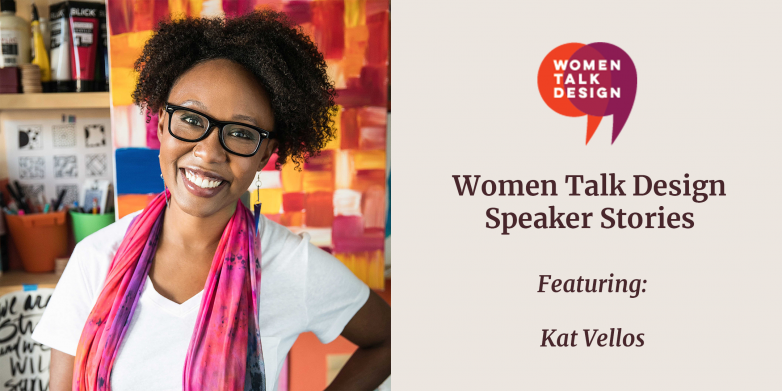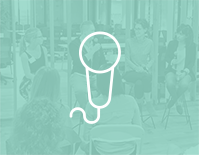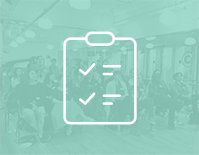Kat Vellos on how she’s handled the vulnerability of visibility to become a speaker make genuine connections
As part of our #WTDSpeakerStories, we spoke with Kat Vellos about getting past the fear that comes with visibility and how to cut through awkwardness to make true connections. Here’s a recap on what Kat shared.
As part of our Women Talk Design Speaker Stories series, we’re interviewing a Women Talk Design speaker every week about their journeys and experiences. We talk to speakers who are just getting started, speakers who have had their fair share of speaking mishaps, speakers writing books, and speakers curating events. At the end, we offer an opportunity for folks from the WTD community to ask their own questions and connect with each other. Visit our events page for more information about the series and RSVP for our next event.

Kat Velos is a user experience designer, author, and speaker who is combatting the loneliness epidemic by helping people foster meaningful connections. Her debut book, We Should Get Together, is helping people around the world experience greater health and wellbeing through the cultivation of fulfilling friendships.
On visibility and vulnerability in her journey as a speaker
Kat talked about the fact that we don’t always know what’s happening behind the scenes of someone’s success. Her own journey as a speaker grew somewhat organically out of her experience as an author and a poet.
“My journey as a speaker has had some dips in the road. It hasn’t always looked like what it is today. I think when we see people, whether it’s online or the media, we only see the after. We only see the immediate moment. And we don’t know all the stuff that it took to get them to that spot. I didn’t just pop out of the womb where I am today, doing conferences and speaking and doing workshops. It was a journey.”
“My very first speaking experience was around a literary community that I started and ran for four years. And so that was my first experience with being really publicly visible.”
As Kat started to put more of herself out into the world, she grappled with the vulnerability that goes hand in hand with visibility.
“…One of the constraints that I felt was anxiety and fear around harassment, honestly…There’s this shadow side to visibility which is that fear that that might happen…I am not interested in that kind of engagement. And so, those were the constraints that I had, that fear and that concern about what would happen if I talked about the things that I cared about.”
Kat also talked about how she was able to find her way back and reclaim her voice through publishing her book.
“I was able to work through that, and I was able to reclaim the voice that I already had in my early 20s, because I wanted to be seen for the things that I cared about and I wanted to speak with my own voice. The catalyst for that reclamation was writing my book. The written word has been the foundation of my path as a speaker. It’s really refocused the topic of visibility back into my life because I wasn’t going to create this thing that I was so passionate about and cared about so much, and then just quietly put it out in the world and not tell anyone that it was there.”
“Publishing this book was about taking the mic, tapping it, and being like, ‘Hey, is this thing on?’ Because holding the mic wasn’t new to me, I had always been that person. But it was this combination of corporate constraints and cultural constraints that had felt like I had muzzle on for the last few years. So, releasing my book, quite honestly, and starting my own business this year were two of the most powerful and energizing things I’ve ever done in my life.”
On burnout and taking a break
Kat also touched on the topic of burnout, highlighting a period in her life where she had to step back, take a break, and evaluate what she wanted to do with her voice.
“I’m an introvert. So doing that kind of work full time and being so public and being so visible and speaking so much and leading so much was burning me out. [And] I didn’t want my whole identity to just be this one thing. I wanted people to know me for me. So I actually stopped doing poetry and, after a while, I stopped facilitating a lot of big events – just to see what it would be like to give myself a break and to let people in the world engage with me in a different way. I took a sabbatical.”
Taking that time away helped her come out the other side and live more fully.
“Speaking and writing is a big part of who I was in my early 20s, and it’s exactly what I’m doing now. So that dip in the middle that I had in my 30s was a break and maybe it was necessary to take a rest because if you do this stuff 100%, every single day and night, all the time, it can get tiring.”
“I was in my cave for a couple of years. I’m really happy to be living a lot more fully right now [and] to call my own shots, to speak on my own terms, and to be really visible about the things I care about. Now it feels available to me in a really full way and, honestly, I had to give myself full permission to take that back on in the fearless way that I was when I was fresh out of college.”
On betting on yourself and taking opportunities as they come
When asked about writing her book, Kat talked about how it grew on it’s own from curiosity and the conversations she was having.
“I wouldn’t have known when I was writing this book that I was going to start my own business and do a whole bunch of consulting and workshops and events that are all on this topic. It was the world responding that was like, ‘Hey we want to have this conversation with you. We want to be involved in what you’re doing and we want to learn and grow from what you’re teaching.’”
Kat discussed using her own experience starting over in a new city as a catalyst to building community and how that ultimately led her down the path she’s on now.
“I’m introverted, but I’m not shy, so I love people and I love community. When I got [to the Bay Area], I felt more at home here than I ever had, but I had a really hard time making regular friends. I was making friends all the time by going to events and brunches and dinners and meetups. But what was difficult was making that leap from being acquaintances and transforming that into being regular friends.”
“I also got really really tired of having small talk. And I decided to create an event called Better Than Small talk…to really provoke feelings of connection….It was a beautiful experience and it was through hosting these events and exploring and writing through this conversation of ‘What does connection look like in adulthood?’ that this body of work kept building. After I had 10,000 words, a woman I know said, ‘Wow, it sounds like you’re writing a book’ and I was like, ‘I’m writing a book. I did not know I was writing a book.’” I was just doing things because I like to make stuff…It came together over my relationship to the topic.”
“I love Mandela Dixon. She says, ‘You never lose if you bet on yourself.’ So I bet on myself and it’s one of the best things that’s happened for my growth for my opportunities.”
On choosing a topic and finding your voice
Kat said her key advice to speakers looking to find their topic is to choose something you care about so you’ll truly want to discuss it.
“What do you care about? What lights you up? What’s something that you think about whenever you have time to think? What’s something that you love learning about? Those topics that provoke a sense of wonder, or fascination, or perpetual curiosity in you are good topics for you to talk about because you will be constantly re-educating yourself about it, reimmersing yourself in the research, in those conversations. And so, you want to pick something you’re not going to get tired of discussing.”
For those just starting to find their voice, Kat shared some recommendations for moving through fear and getting comfortable.
“[Start] small and then when you get comfortable with that, you take another level up, and then you take another level up, and another level up. Scaffolding is a key part of building any kind of skill, whether it’s leveling up your comfort speaking or whether it’s trying to lift weights…It’s scaffolding up the level of risk so that when it is time to do a company speaking event or an external facing event, it doesn’t feel as scary because you didn’t have to jump from zero to 100 – you got to go 10 steps at a time. You can get more comfortable with it.”
On building connections and fighting the loneliness epidemic
Kat is on a mission to help the world connect. She talked about why connections are so important and how to cut through the awkwardness.
“To be with other people who share some part of your identity, [who] can identify with some part of your journey…helps it feel less lonely because you can at least look and [think] ‘Wow, I care about this thing and everyone else who’s in this room cares about this thing too.’”
“Don’t think about it so much as networking. Think about it more as an opportunity to build a relationship. And try not to focus on ‘Who do I talk to?’ or ‘How do I know if I find the right person?’ Just focus on making one or two connections that feel meaningful. Not every single conversation has to lead to the best conversation of your life. If you find someone you connect with and all you have is one really great 15 minute conversation with them, it’s okay to say ‘Wow, that was enough for me. I feel satisfied.’”
“I really want to avoid those small talk questions. So, lead with curiosity first and be the person to ask a question first. Often, that aikidos that small talk out of the way. And when you ask somebody a more interesting question, people are not only pleasantly surprised, but they describe it as refreshing and a relief to talk about something else. If you show that curiosity, show that interest in learning about another person, and give them a chance to step forward into something that’s a little more unique, that often dissipates a lot of the anxiety or awkwardness.”
For more on Kat’s Connection Club, the difference between facilitating and participating in a community, and how she’s fighting the loneliness epidemic, check out the full video:
Thank you to AdobeXD for sponsoring this event series!

